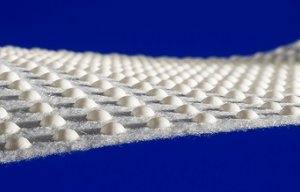
Monforts to present new Montex XXL stenter at INDEX17
The company invested in the new technology following the merger and consolidation of the companies at the Fourneaux site.

15th February 2018
Innovation in Textiles
|
Mönchengladbach
According to Monforts, its Montex 8500 stenter is providing major benefits for Hugotag, a specialist French finisher of silk fabrics to many of the world’s most prestigious luxury brands. Now a member of the Chanel Group, the company represents the merging five years ago of two former silk businesses – Tag, founded in 1974 in Fourneaux, close to Lyon, and Hugo Soie, a St Etienne-based company with a 200-year history.
The company invested in the new technology following the merger and consolidation of the companies at the Fourneaux site, including advanced digital printing machines, as well as the installation of a finishing line centred on the latest Monforts Montex 8500 stenter and a Matex padder.

The five-chamber Montex 8500 machine at the Fourneaux plant is equipped with newly-developed 24-inch visualisation monitors, providing total, intuitive automation and surveillance via the Monforts Qualitex 800 system.
“It’s an excellent machine. The key parameters for us include homogenous drying over the length and width of the machine and precise control of the tension of the fabric, because the silk has a natural elasticity, even without the addition of elastane. The Monforts stenter allows us to completely control the tension from the fabric entry right through to the winding machines – and we have special units for winding onto small rolls too,” said Hugotag Director General Philippe Magat.

“The fabrics are very delicate and require a sensitive treatment when being pinned into the stentering chain, as well as very gentle drying – without the fabrics ever touching the nozzles and with absolutely no air turbulence in the dryer.”
“The humidity of the air inside the stenter is crucial for ensuring a perfect quality fabric feel,” said French representative for Monforts, Christophe Monel, of Monel Industrie Services.
Hugotag is finishing some very fine silk fabrics – sheer muslins that can be as light as 14 gsm, along with chiffons, and heavier satins and twills. The weights of the more delicate fabrics are usually between 20-50 gsm and produced in average widths of 90 cm to a maximum of 1.9 m on the 3.2-m wide Monforts finishing range.

As a result of the specialist nature of handling such delicate fabrics, the Monforts line has been equipped with a number of additional features, including special needle chain devices for dealing with knitted silk fabrics, a steamer unit, a computerised weft-straightening device and associated controls, and a horizontal combined chain.
The stentering chain is completely sealed – to avoid any grease or oil coming into contact with the fabrics at any time – and fitted with long-lasting lubricated bearings, the company reports. Special attention has also been paid to energy recovery, with low energy consumption IE3 motors and the integration of a full heat recovery system into the line. Philippe Magat confirmed that this is now providing Hugotag with significant energy savings.
Like its equally famous counterpart in Italy – Como – Lyon has historically been associated with silk fabric production, and all of Hugotag’s fabrics are still woven locally. Piece-dyeing was introduced in Lyon and became an industrial process in the mid-18th century and for a long time remained a speciality of the region. Screen-printing is meanwhile sometimes known as a la lyonnaise because Lyon is acknowledged as the first region to industrialise the process during this same period.

And although there still remain other silk finishers in France, Hugotag is one of only two to carry out the degumming of the silk fabrics using Marseilles Soap – a chemical-free formulation based on 100% olive oil. “It’s a very specific treatment and because the fabric is so very delicate it’s very difficult to do on an industrial machine, but we can now do it successfully,” said Philippe Magat. “More than anything, however, zero defects are our objective, and this is something the new highly-automated and computerised Monforts line is allowing us to achieve.”

Business intelligence for the fibre, textiles and apparel industries: technologies, innovations, markets, investments, trade policy, sourcing, strategy...
Find out more